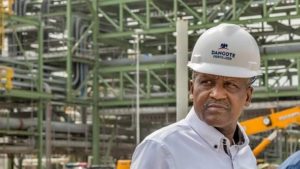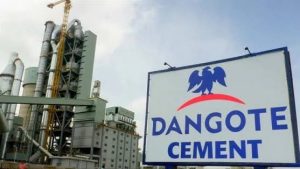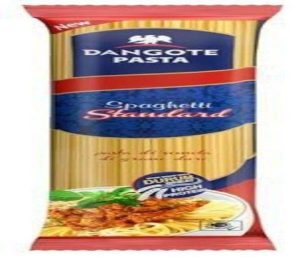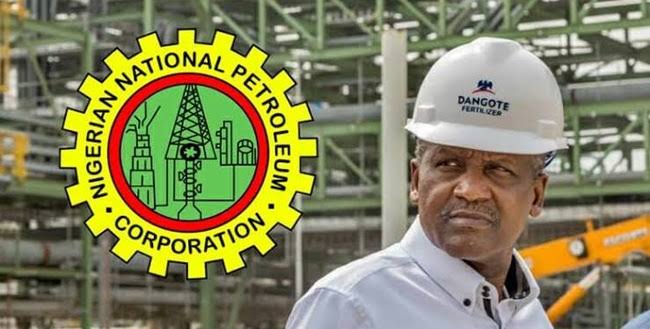Though NNPCL is not a saint, the conflict between the national oil company and Dangote Refinery is a typical Aliko Dangote strategy for muscling out competition.
By Charles Adewole
Aliko Dangote, Africa’s richest man until August 2024, and Nigerian National Petroleum Corporation Limited, NNPCL, Nigeria’s state oil company, have many things in common. Both are business partners; both are avid monopolists; both leverage on government patronage to muscle out competition and both are passionately Nigerian, among other shared characteristics.
Dangote is Nigeria’s top business icon. From an initial seed money of N500, 000 loan from his uncle, he started business with in 1977, Dangote bullied way to a $13.4 billion net worth in August 2024, down from $13.9bn in April. He dominates any field of business endeavour he is into or quits.

Today, the Dangote Group has international operations in Benin, Ghana, Zambia, and Togo. He scaled up from a trading company to the largest industrial group in Nigeria spanning Dangote Sugar Refinery, Dangote Cement, Dangote Flour, salt factories, flour mills, a major importer of rice, fish, pasta, and fertilizer.
The company also exports cotton, cashew nuts, cocoa, sesame seeds, and ginger and has major investments in real estate, banking, transport, textiles, oil, and gas.





Dangote Sugar controls 70 percent of the sugar market in Nigeria with an average production of 800, 000 metric tonnes per annum; while he controls 65 percent of the cement market with a production capacity of 52.0 million tonnes per year across ten countries. Put together, Dangote Group employs over11,000 workers in West Africa. So Dangote is a Nigerian success story.
Having made a success of most businesses he had gone into, Dangote decided to take advantage of the supply gaps in the lower stream of Nigerian oil sector by building an oil refinery. He is a big player; so he started building the Dangote Refinery said to be the largest single-train refinery in the world at the cost of $19 billion project in 2017. It took him seven years to complete it in 2024.
However, then president, Muhamadu Buhari commissioned the refinery ahead of its completion on May 23, 2023. It was to take another one year plus for the company to refine its first litre of fuel.
Dangote is characteristically a very calculative and cautious investor. Located in the South-East of the Lekki Free Trade Zone (FTZ) in Ibeju-Lekki, Lagos, covering a land area of about 2,635 hectares, you would expect Lagos State to have an equity participation to give the host state a sense of belonging and a prime investment. However, Dangote managed to make an outright purchase of the land at the cost of $100m.
Dangote financed the refinery through funds from the Dangote Group, loans and investment by NNPCL. On August 4, 2021, Nigeria’s Federal Executive Council approved request by NNPC to acquire a 20 percent stake in the refinery for $2.76 billion. However, on July 15, 2024, Dangote announced that “NNPC no loner owns 20 percent stake in the Dangote Refinery. They were to pay their balance in June but yet to fulfill their obligations. Now they only own a 7.2 percent stake in the refinery.” It then means that Dangote owns 92.8 percent of Dangote Petroleum Refinery and NNPC a minor shareholder with 7.2 percent.
The first and most important mission statement of the company is “To deliver strong returns to our shareholders by selling high-quality products at affordable prices, backed by excellent customer service.” Others are: “ To help Nigeria and other African countries towards self-reliance and self-sufficiency in the production of the world’s most basic commodity, by establishing efficient production facilities in strategic locations close to key growth markets.
To provide economic benefits to local communities, by establishing efficient production facilities in strategic locations close to key growth markets. To provide economic benefits to local communities by way of direct and indirect employment in all countries in which we operate. To lead the way in areas such as governance, sustainability and environmental conservation and to set a good example for other companies to follow.”Among its stated three core values is “leadership: We thrive on being leaders in our business, markets and communities. To drive this, we focus on continuous improvement, partnership and professionalism.” The oil industry is a multi-stakeholder industry; so, achieving the leadership goal will not be without conflicts. This quest for ‘leadership’ in every business he does leads to obsession for power and control by Dangote. This is marked by carcasses of companies he trampled upon on the way to achieving his idea of ‘leadership.’
Followers of the Dangote business model had predicted that his entry into the down stream sector of the oil industry will not lead to lower prices but would rather lead to higher prices. This happened in the cement sector where Dangote’s 65 percent dominance has not led to lower cost. As soon as the company muscled out other competitors, prices escalated and continues to increase at will because the company is focused on profit for its shareholders, not public sentiments.
True to this, the pump price of petrol rose swiftly on Dangote’s entry into the market. By the business arrangement, Dangote Refinery can sell diesel and other products directly to marketers; while petrol will be sold only to NNPC for distribution to the marketers. According Olufemi Soneye, spokesperson of NNPC, Dangote sold the first delivery to NNPC at the cost of N898 per litre.
Anthony Chiejina, group chief branding and communication officer of Dangote Refinery denied this in an official statement thus: “Our attention has been drawn to a statement attributed to NNPCL spokesperson, Mr Olufemi Soneye, that we sell our PMS at N898 per litre to the NNPCL. This statement is both misleading and mischievous, deliberately aimed at undermining the milestone achievement recorded today, September 15, 2024, towards addressing energy insufficiency and insecurity, which has bedeviled the economy in the past 50 years.
“We urge Nigerians to disregard this malicious statement and await a formal announcement on the pricing, by the Technical Sub-Committee on Naira-based crude sales to local refineries, appointed by His Excellency, President Bola Ahmed Tinubu GCFR, which will commence on October 1, 2024, bearing in mind that our current stock of crude was procured in dollars.
It should be noted that we sold the products to NNPC in dollars with lots of savings against what they are already importing. With this action, there will be petrol in every local government area of the country regardless of their remote nature. We assure Nigerians of availability of quality petroleum products and putting an end to the endemic fuel scarcity in the country.”
Chiejina was being economical with the truth. He denied selling at N898 but could not disclose how much the company sold that amounted to ‘lots of savings.’ However, Soneye reaffirmed N898 and Dangote kept quiet.
In addition to landing costs from refineries, NNPCL explains that suppliers pay statutory and regulatory charges for each litre of petrol as follows: NMDPRA fee N8.99; inspection fee N0.97; distribution cost (Lagos) N15.00; and profit margin N26.48. After adding freighting and other statutory costs, the product pump price jumps to N950.22 per litre in Lagos, N980.22 in Rivers, N992.22 in Abuja and N1, 019 in Maiduguri N1,019.
Shortfall in Dangote supply.
Apart from the price conflict, Dangote failed to deliver on its supply obligations. By the agreement between both parties, Dangote Refinery is supposed to deliver 25 million litres daily to NNPC for the month of September. From October, this would go up to 35 million litres daily. In the first three days, it recorded 65 million litres supply gap. It means that instead of supplying 75 million litres in three days, Dangote supplied only 10.3 million litres through its gantry loading system, giving a massive shortfall of nearly 65 million litres.
This is why there is fuel shortage in the country, despite the deregulated price, allowing black marketers to step into the supply gap and sell at as much as N1, 500 a litre in Abuja. In expectation of the Dangote deliveries, The Nigerian Midstream and Downstream Petroleum Regulatory Authority, NMDPRA, did not clear NNPC Trading Limited to import petrol for October and onwards, revealed an official under anonymity. This has created serious supply gap from Dangote Refinery as insiders revealed there is not enough product to go round the country.
According to NMDPRA the truckout of petrol from depots across the country averaged 51.10 million litres daily between 1 January 2024 and 18 September 2024. Dangote Refinery has an installed capacity of 650, 000 barrels daily; while NNPC’s four refineries have a joint capacity of 450, 000 b/d. Nigeria has 500, 000 b/d allocation for domestic use.
On 15 September, the first day of loading, the Dangote Refinery supplied NNPC Retail Ltd 2.48 million litres of petrol in 56 trucks. On 16 September, NNPC Retail and AYM Shafa 74 truck loaded 3.3 million litres; while on 17 September 4.5 million, giving a total of 10.3 million litres in three days, instead of 75 million litres.
However, Chiejina, claimed in an interview with Vanguard Newspaper, without evidence, that Dangote Refinery had supplied 111 million litres within those three days. “We have already loaded 111 million litres of petrol, and the exercise is ongoing. We are refining and have no reason not to load. So, loading is ongoing and we will continue to provide the product to the market,” Vanguard quoted him as saying.
Here again, Chiejina appears to have been economical with the truth as official Dangote Refinery documents for the period showed that the facility only refined 24,700 metric tonnes of petrol, about 33 million litres at 1,322.76 litres per ton. This is 42 million litres short of the 75 million the refinery committed to supplying for three days, at 25 million per day. The refinery, according marketers must load at least 500 trucks daily, with each vehicle carrying at least 50,000 litres of petrol to meet this volume. This appears difficult but with the facility’s 177 loading points, they feel it can be done.
It was gathered that NNPC asked the refinery for vessel loading but were told that the operation facilities needed to be prepared. Consequently, the vessel MT Binta Saleh which was already on standby to proceed for loading, was withdrawn, one official said.
Dangote’s trail of monopoly
Dangote’s paved road of business success is littered with the skeletons of competitors he hounded out of business through government patronage. He is said not to be comfortable with a level playing field. In United States and other western democracies, he would have been charged with the violation of antitrust laws on fair competition in business, which attract heavy sanctions and fines. In cement and sugar businesses, many competitors without his level of government leverage have been destroyed and their territories annexed.
Ibeto Cement has a bitter story. Ibeto was an obstacle to Dangote in the Eastern market with his bulking plant in Port Harcourt and having acquired the legendary Nigercem Nkalagu for the backward integration project, his cement was preferred to Dangote in the East. When he collapsed under the weight of Dangote-FG conspiracy, Dangote trailers rolled triumphantly into the lucrative Southeast market.
An industry analyst says that Dangote doesn’t have the character of a good businessman. In the past 20 years of his business imperialism within which he became the richest man in Africa and the 158th in the world, Obasnjo, Jonathan and Buhari gave him leeway to do quite a whole lot of things to the disadvantage of competition.
In Kura, near Kaduna, a very large rice growing area, a very large portion of land was acquired by Dangote from the villagers on the pretence that he wanted to set up a tomato business. Today, no compensation has been paid to those people.
“There’s no rice growing there and there’s no tomato farm or factory,” lamented a villager.
The same story obtains in the sugar industry. When he went into the sugar industry, virtually every other importer was priced out of the market and he bestrode the market like a colossus. So, he has always been a monopolistic businessman who fights dirty to destroy fair competition.
In cement, only BUA matched up and refused to be muscled out of business. The same pitched battle in Sugar. He embarked on the noodles manufacturing warfare but the Indomie group and Spagetti by Flour Mills gave him a good chase.
According to industry sources, anything Dangote does he wants to be on top of it; he wants to be a monopolistic trader that he always wants to be.
Coming into the downstream sector, Dangote has brought the same strategy of ‘leadership’, not minding there were other players before his arrival. And petrol is a commodity that effects every Nigerian, just like salt, sugar and rice. This mentality makes a conflict inevitable in the downstream oil sector because NNPC is no longer a lame government parastatal. It is now a limited liability company, primed for business success under standard corporate governance. Dangote has built a 650, 000 b/d refinery and NNPCL has 450, 000 b/d capacity refineries. Dangote tells the whole country the refinery can meet Nigeria’s daily consumption and export the balance.
So what becomes of NNPCL refineries, whose rehabilitations are nearing completion? Dangote appears not ready to share the domestic market with NNPCL and emerging players, including expected modular refineries in the Niger Delta.
He is now said to be a business monster created by federal government patronage. They gave him exchange rate at CBN rate, gave him leeway to import and even to invest NNPC money into his refinery business. Now the refinery is said to be ready and Dangote signed an agreement to be allocated crude oil for refining. However, instead of refining all that was given to him he allegedly exported some of the crude oil, obviously to make dollars.
This suggests that he intends to become an exporter of crude oil as well by stealing the oil allocated to him for domestic use and exporting it for higher profit! In countries like China, Singapore and North Korea, this could earn one life imprisonment or death sentence. But Dangote gets away with it in Nigeria and does even more daily.
The question being asked is, “how come that with the first sale you couldn’t deliver the 25 metric tons you signed off on?” The agreement is simple and NNPC has been clear on what they want; they give you fuel, you refine and give back to them so they can subsidize and distribute. NNPC says they are not fixing price for Dangote. Dangote can fix his own price but NNPC has a share price they can always collect from Dangote. They are partners. They put up resources together to set up the refinery. The refinery has a percentage of NNPC interest said to be 20 percent by NNPC but 7.2 percent by Dangote.
“This is not the old NNPC; this is the new NNPC Limited. It’s a limited liability company; it’s not like the old NNPC where anybody could do anything and get away with it. This time they are under public scrutiny. And being under public scrutiny, it becomes absolutely necessary to comply with the laws of the land,” explains an insider not authorized to speak for the company.
According to him, “The new NNPC is the first one that has taken the step of upgrading the refineries. Port Harcourt is on stream; it’s almost ready.” This means in addition to being partners, Dangote and NNPCL will soon be bitter business rivals competing for clients in the downstream sector.
“This is the man, Dangote; he is obsessed with himself. He is obsessed with everything. Obsessed with wanting to be on top of everything. Obsessed with wanting to be in control; obsessed with making sure that every other competitor is trampled upon!” said a stakeholder.
The Political Disconnection
Dangote is a smart businessman. He knows he can leverage on politics to feather his business cap but he also knows that a turn in political fortune can spell doom for one’s business empire. Because of this wisdom he stays away from party politics. He is not member of any political party but is said to donate generously to campaign funds of leading presidential candidates and gubernatorial candidates of states where he has investments. This way, head or tail, he wins. It is said that what he does is to support the two frontrunners from leading parties so that anyone that eventually wins will favour him. It was strongly alleged that Obasnjo attempted to pressure him into politics and make him run for the top job but Dangote wisely declined so he could continue building his business empire.
However, in 2023, it is whispered that Dangote did not support Tinubu but rather supported Atiku Abubakar of PDP. Some people are wondering if the conflict is a fall out of political brinkmanship or an attempt to frustrate the regime of Bola Tinubu with petrol until it gets disfavoured in the eyes of the public?
Be that as it may, business is supposed to be business. As you signed an agreement, you should deliver. “Stop blackmailing the federal government. Stop ridiculing your business partner NNPC Limited,” advised an industry stakeholder who does not want to come on record.
In May 2024, Dangote reaffirmed his ambition regarding the re-appropriation of energy resources in Africa saying, “My dream is to use raw materials from Africa, refine them and sell them on our own market,” yet he sold the first crude oil given to him to refine. For this dream to work in Nigeria’s downstream oil sector, it must be a shared solution. It must go beyond Dangote’s obsession with domination and control to embrace all industry stakeholders, ensure a fair pricing for product users and bring peace and stability to Nigeria.
Share your story or advertise with us: Whatsapp: +2347068606071 Email: info@newspotng.com















